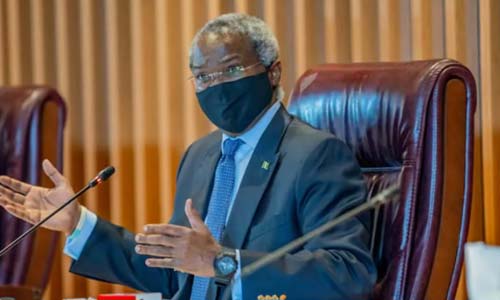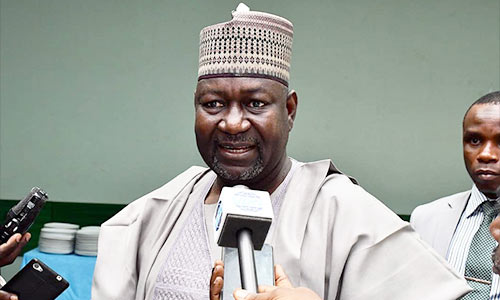THE EXECUTIVE 12/02/2022
Federal Ministry Of Works And Housing Streamlines To Mitigate Climate Change, Says Fashola

Minister of Power Works and Housing, Mr Babatunde Fashola has said that the federal government remained committed to the Paris Club Agreement in climate change.
Fashola said the commitment of the federal government has informed its decision to streamline the ministry of Works and Housing alongside.
Fashola said this in a statement from the ministry and signed by the Director, Press and Public Relations, Boade Akinola.
According to the statement, Fashola stated this, when the Faculty members and participants of the Executive Intelligence Management (EIMC) Course 15 of the National Institute for Security Studies paid him a courtesy visit in his office.
Speaking on the theme of course 15 of the institute, “Global Climate Challenges, Prospects and Priorities for Economic Development and Conflicts Resolutions in Africa,” Mr Fashola commended them for the choice of the theme which he said places emphasis not only on human capital development but on national development.
In compliance with climate change, the Minister said that as a Ministry, The Management have a role to play both in terms of policy and delivery.
In the housing sector, for instance, the Ministry has developed a national building code for effective building in terms of sizes of windows and materials for buildings that would affect the level of the impact of temperature.
He added that the entire Ministry was now powered with energy-saving bulbs with well over 400 air conditioners with energy efficiency.
In the Works sector, the Minister stated that the Ministry had embraced some new technology of recycling used materials for road construction.
“New technology of recycling is being used on the Abuja-Kano Highway, by recycling those materials used in the construction of the road in 1991. This again shows our level of compliance,” Fashola stated.
Identifying water shortage as one of the major causes of conflict, he said that the human race has taken so much from nature that nature is fighting back.
The dwindling water in Lake Chad for instance has generated a lot of conflict in the Lake Chad region and environs. “That was why President Muhammadu Buhari has consciously drawn attention to the dwindling resources of Lake Chad and the consequent as it will generate,” he explained.
The visiting Deputy-Commandant of the Institute, Didacus Egbeji, FSI said that the National Institute for Security Studies (NISS), was the foremost security training Institute in Nigeria that prepares high-level security intelligence professionals, as well as senior-level managers for critical roles in the sustenance of national security.
He said that the main objective of the institute was to train top-level management with a broader outlook, intellectual depth and the capacity to deal efficiently and effectively with deep analytical insight into the development and utilization of available resources towards effective management of the complex security challenges in a democratic dispensation.
Speaking on the theme of this year’s course: “Global Climate Challenges, Prospects and Priorities for Economic Development and Conflicts Resolutions in Africa” he said that climate change has had adverse consequences bothering on our national development, infrastructure and national security.
He said that the purpose of the courtesy visit to the Honourable Minister of Works and Housing was to get firsthand information on how the Ministry was adapting to the climate challenges in terms of human and capital development.
President Buhari had in 2016 signed the Paris Agreement on Climate Change, as one of the side events of the 71st Session of the United Nations General Assembly, UNGA71 with a commitment to reduce greenhouse gases.



